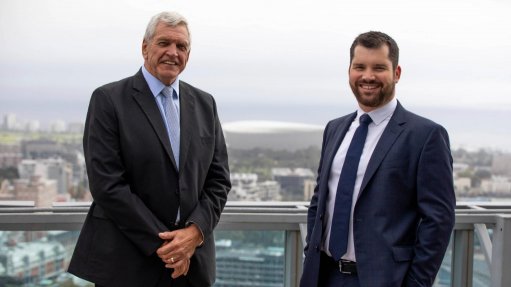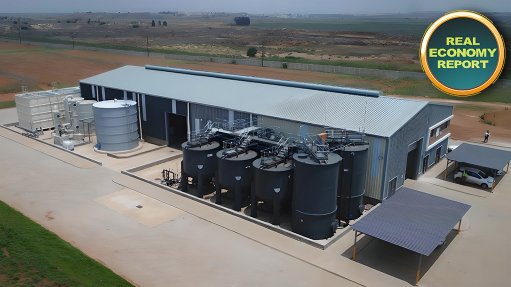Addressing SONA's omission of individual infrastructure needs
This article has been supplied as a media statement and is not written by Creamer Media. It may be available only for a limited time on this website.
Some of governments’ top responsibilities are to provide people with access to fresh, drinkable water, and to basic infrastructure such as sanitation, roads, and housing. With this in mind, the construction industry hopes to see government release more detailed plans regarding projects and programmes for meeting households’ needs in 2023, argues Roelof van den Berg, CEO of the Gap Infrastructure Corporation (GIC).
President Cyril Ramaphosa highlighted both water, sanitation, and infrastructure as key nation-building instruments during his recent 2023 State of the Nation Address (SoNA), indicating that government will emphasise and increasingly invest in structural development in the coming months.
“For a nation to thrive, its people need to be healthy, have access to basic housing, and be able to physically reach economic opportunities. For this, the government must provide people with access to adequate water and sewer reticulation systems, suitable housing, and practical, functional roads,” says van den Berg.
“This is, ostensibly, the path that the President has placed government on for this year. But SoNA only gave us an overview of a few large-scale infrastructure projects that are currently in the pipeline, and made no mention of the government’s intentions to address smaller, more localised problems that affect the average person every day.”
Addressing the water and sanitation issues
Van den Berg notes that a large portion of SoNA was dedicated to urgent measures for addressing the ongoing electricity crisis, but that electricity should not completely overshadow other developing problems.
“It is imperative that we start preparations to avoid what could be the country’s next major crises: severe water shortages and spiking health issues associated with lacklustre sanitation infrastructure,” he emphasises.
Ramaphosa mentioned that the Department of Water and Sanitation is in the process of investing in a few major infrastructure projects nationwide, such as Phase 2 of the Lesotho Highlands Water Project. This project includes construction of a dam, transfer tunnel, and reservoirs that will help secure water for Gauteng, the Free State, North West, Mpumalanga, and the Northern Cape.
“However, while projects in key areas such as the Lesotho Highlands will be pivotal in securing water supply, this does not address the lack of in-home water and sewer connections still plaguing the nation.”
The latest General Household Survey released by government reveals that 11.3% or just under 7 million people still do not have access to piped or tap water in their dwellings. Additionally, only 64.8% of households have flush toilets that are connected to a public sewer system or septic or conservancy tanks. Another 13.4% still largely rely on pit toilets.
GIC emphasises the importance of sewer reticulation systems and improved household sanitation connections, understanding just how crucial they are to improving South Africans’ personal hygiene and, as a result, their health.
To date, GIC has installed over 100,000 sewer reticulation networks in a multitude of underserviced areas, giving access to fresh drinking water and sewer connections.
“To make a lasting impact in many South Africans’ lives, we need to take a more individualised approach to infrastructure development and install water and sewerage connections in every home in the country.”
A roadmap required for roadworks
Roads are notoriously difficult to maintain. High traffic rates, heavy vehicles, and excessive rain take their toll on public roads. Government’s role, however, is more responsive than preventative in this regard, which means that a large portion of the roads budget must be allocated to road repairs each year.
According to research from consulting firm Frost and Sullivan, more than half of the country’s unpaved and almost a third of its paved roads are in a poor to very poor condition.
“Many roads that link important metropolises, and especially roads in rural areas, are simply inadequate for transport and commuter needs. Considerable repairs and improvements are needed to enable people to access employment opportunities, or allow trucks to transport goods to stores in small communities.”
Addressing the roads problem, and infrastructure development in general, Ramaphosa announced that R600 million has been allocated to Infrastructure South Africa for project preparation within rural and under-resourced areas. By January, some R232 billion worth of construction projects were already underway.
Importantly, the South African National Roads Agency has reportedly already awarded R18 billion worth of road construction contracts in the past three months alone. This is an important step toward fixing the local roads network, adds van den Berg.
Overcoming the skills obstacle
Increased construction directly translates to higher employment among skilled, semi-skilled, and unskilled workers. But large, state-driven construction projects require experienced developers which employ highly skilled and qualified engineers and other technical workers.
“The President explained that one of the greatest obstacles to infrastructure investments is a lack of technical skills and project management capacity. Fortunately, South Africa is home to many prominent, large developers capable of managing complex national projects and employing, overseeing, and upskilling smaller contractors to ensure that government meets its infrastructure goals.”
GIC employs some of the top engineers, architects, and project managers in the country, and specialises in the development of water reticulation systems, dams and canals, water treatment and purification works, sewage pump stations, residential and low-cost housing, national roads and transport infrastructure, stormwater drainage, and gravel road construction and upgrades.
“Partnerships between government and private infrastructure development companies will be vital in restoring and upgrading South Africa’s ailing and outdated infrastructure, and many large developers are ready to pick up the mantle,” concludes van den Berg.
Comments
Press Office
Announcements
What's On
Subscribe to improve your user experience...
Option 1 (equivalent of R125 a month):
Receive a weekly copy of Creamer Media's Engineering News & Mining Weekly magazine
(print copy for those in South Africa and e-magazine for those outside of South Africa)
Receive daily email newsletters
Access to full search results
Access archive of magazine back copies
Access to Projects in Progress
Access to ONE Research Report of your choice in PDF format
Option 2 (equivalent of R375 a month):
All benefits from Option 1
PLUS
Access to Creamer Media's Research Channel Africa for ALL Research Reports, in PDF format, on various industrial and mining sectors
including Electricity; Water; Energy Transition; Hydrogen; Roads, Rail and Ports; Coal; Gold; Platinum; Battery Metals; etc.
Already a subscriber?
Forgotten your password?
Receive weekly copy of Creamer Media's Engineering News & Mining Weekly magazine (print copy for those in South Africa and e-magazine for those outside of South Africa)
➕
Recieve daily email newsletters
➕
Access to full search results
➕
Access archive of magazine back copies
➕
Access to Projects in Progress
➕
Access to ONE Research Report of your choice in PDF format
RESEARCH CHANNEL AFRICA
R4500 (equivalent of R375 a month)
SUBSCRIBEAll benefits from Option 1
➕
Access to Creamer Media's Research Channel Africa for ALL Research Reports on various industrial and mining sectors, in PDF format, including on:
Electricity
➕
Water
➕
Energy Transition
➕
Hydrogen
➕
Roads, Rail and Ports
➕
Coal
➕
Gold
➕
Platinum
➕
Battery Metals
➕
etc.
Receive all benefits from Option 1 or Option 2 delivered to numerous people at your company
➕
Multiple User names and Passwords for simultaneous log-ins
➕
Intranet integration access to all in your organisation

















